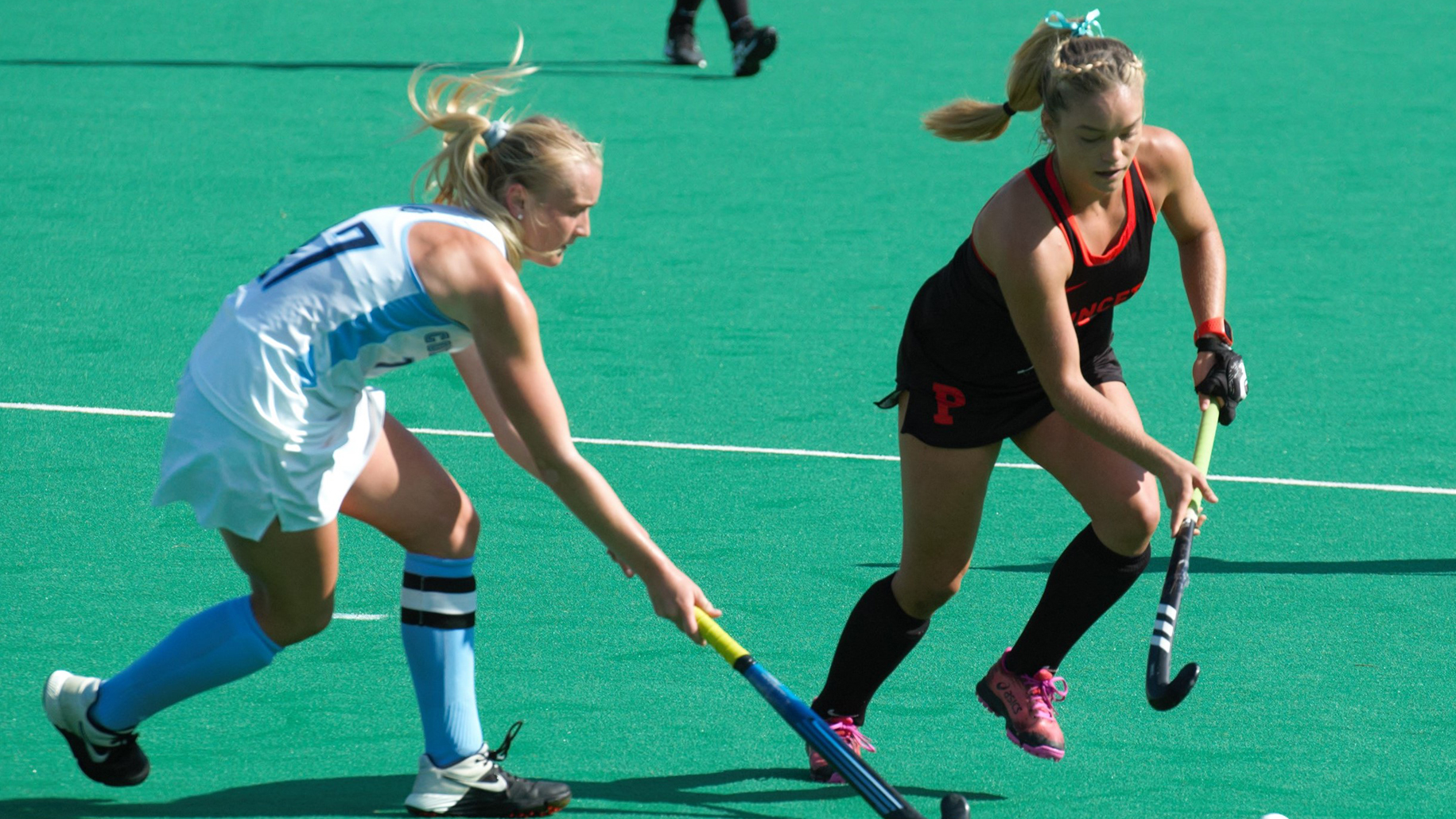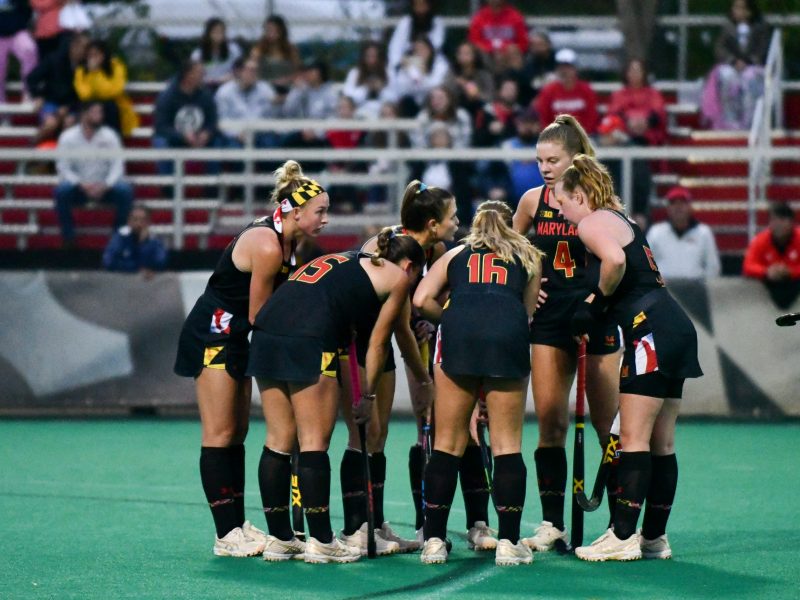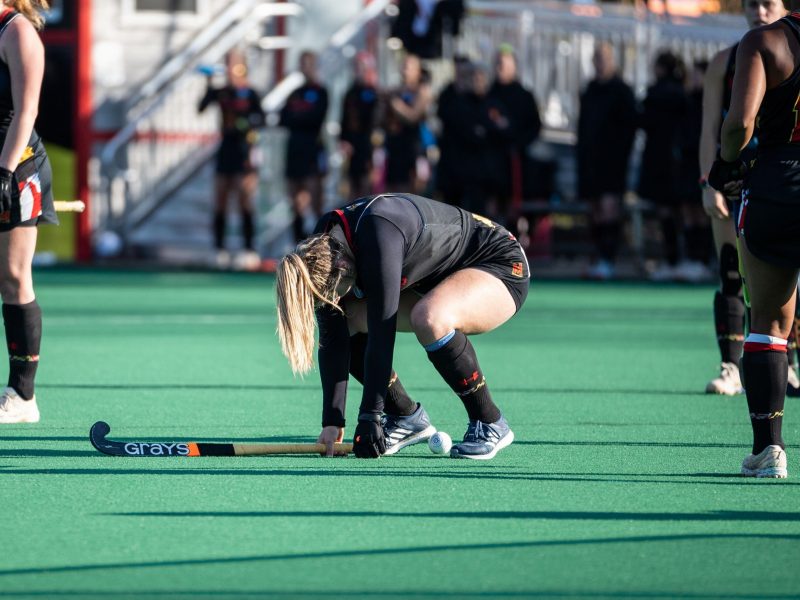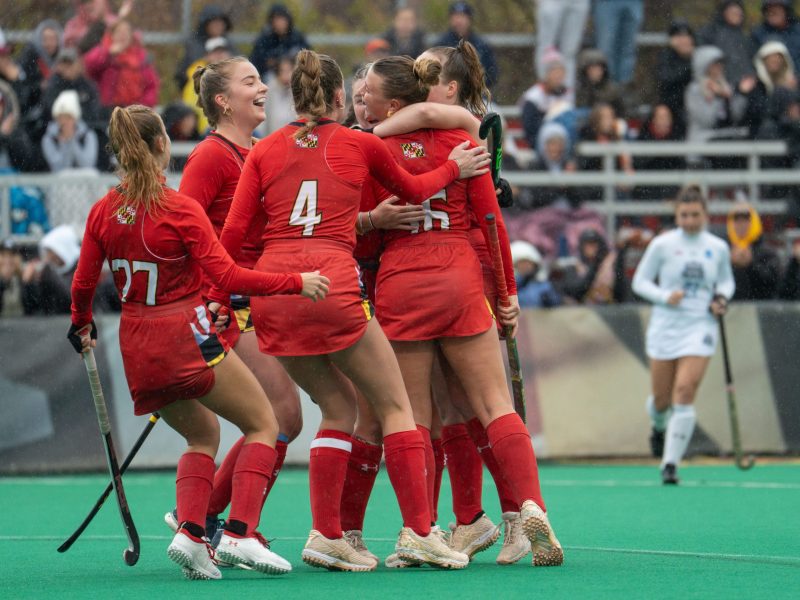Julianna Tornetta hung her head in disbelief. As she watched Maryland field hockey freshman Bibi Donraadt split two of her teammates and rifle a match-winning shot toward the upper section of the cage, her sophomore season at Princeton came to an end in the 2018 NCAA semifinal.
Tornetta, an attacking midfielder, took the Tigers’ only shot on goal that day. And it was saved by Terps’ goalkeeper Sarah Holliday.
Now, about two-and-a-half years later, Tornetta will be joining Maryland for the fall 2021 season. But at the time, it wasn’t the Terrapins’ stellar program that was on Tornetta’s mind.
One of her older sisters, Sophia, was among a senior class at Princeton with whom Tornetta had grown close with. Tornetta and her sister had visited colleges and attended camps together. Since the spring of her freshman year of high school, Tornetta had been playing for the Tigers field hockey club.
“A lot of my Princeton friends have asked me about that, basically like: ‘You traitor, how could you do that?’” Tornetta said, laughing. “Because of that 2018 semifinal game and these other super close wins and losses with Maryland.”
But drastic change — here, abandoning one side of a rivalry for the other — isn’t new to Tornetta, whose path to the field hockey pitch began somewhere else entirely.
From modeling to field hockey
On Tuesday, Tornetta became one of 36 athletes named to the 2021-22 U.S. Women’s National Team roster. Some nationally acclaimed athletes spent countless hours during their childhood learning the sport they grow to master. Tornetta had a different experience in her early years — she spent a lot of her elementary and middle school life as a child model.
“Athletics wasn’t exactly the center of my life at that point,” Tornetta said.
But around fourth grade, she began to realize modeling wasn’t the best activity for her. She found herself missing her friends as the Plymouth Meeting, Pennsylvania, native was frequently traveling to New York and missing school, classes, trips, activities and a lot of childhood moments.
So, she told her parents she was sick of it. And by then she was getting braces soon, which she joked “would have been an even worse look.” Then, she turned to field hockey.
[All-American Julianna Tornetta joins Maryland field hockey via transfer portal]
“I just loved athletics from the moment I really got into field hockey,” Tornetta said. “But I would be lying if I said a large part of that was the fact that my growth stopped at approximately 5-foot-4. I think that’s not great for the modeling industry from what I’ve heard.”
Tornetta knew she enjoyed working collaboratively with others. Long before she decided to attend the University of Maryland’s business school, she had an interest in team-oriented activities. With child modeling, that was nonexistent — there was a singular focus on her.
“Field hockey was the perfect outlet for her to combine her passion, her hard work, determination,” Sophia Tornetta said. “It’s something she always had, and then once she found field hockey, she was really able to explode and develop into this all-around … amazing person and player on and off the field.”
Sports, sports, sports
In addition to playing field hockey for the WC Eagles club team, Tornetta also tried some other sports, such as lacrosse and track. She even competed on the varsity lacrosse squad in her freshman year at the Agnes Irwin School.
Through her time on the Owls’ lacrosse team, she had seen three different girls tear their ACLs in her lone season. She was still playing field hockey year-round and found herself leaving lacrosse games early for field hockey games. While she enjoyed playing lacrosse, seeing those injuries to her teammates made her realize she couldn’t risk severe injury in a sport that wasn’t even her favorite.
Tornetta gave up lacrosse after that season on varsity and returned to track in her sophomore spring.
“I tried doing hurdles for some unknown reason,” Tornetta said, joking about her short legs. At one point, she twisted her ankle, leading her to focus solely on field hockey from that point forward.
Sophia Tornetta remembers watching her younger sister dabble in all these different sports. But seeing her on the field hockey pitch was completely different than anything else. While her athleticism and speed helped her succeed in track and lacrosse, the passion she had for field hockey was evident.
“She glowed,” Sophia said.
The Tornetta family
Tornetta’s start to field hockey came after Sophia Tornetta and their oldest sister, Olivia, had begun to play the sport. Olivia Tornetta’s interest in field hockey sparked Sophia Tornetta’s career — one that included being named 2015 Ivy League Rookie of the Year.
Aside from the trio of daughters’ field hockey experience, the Tornettas — who also have a son, Andrew — have always been an athletic family. Their father, Paul, played baseball in college, and their mother, Sherry, was a cheerleader.
When Sophia Tornetta headed to Princeton, Tornetta had left WC Eagles for the Tigers’ club team. Sophia Tornetta still played for WC Eagles before she graduated high school, causing the pair to compete against each other several times. The duo played together at Agnes Irwin, and they’d eventually be back together on junior national teams and Princeton.
But before all this high-level competition, the two had been privately training together since they first picked up sticks.
At their middle school, there’s a grass field with a field hockey goal. On most days during the summer, the sisters would go pass the ball around and take turns shooting on goal. In high school, they would drive together to a turf field and do the same thing.
And they preferred to only share shooting practice.
“We stayed away from the 1-v-1s, because it turns out that both of us are pretty competitive. And both are extremely sore losers,” Tornetta said. “So that would always end with someone yelling at someone else, maybe some tears, probably some injuries of some sort.”
Her practice opponent feels the same way. Sophia Tornetta said she feels it made her better — but she could never let her little sister beat her.
“I said in my head, ‘I’m not gonna let her get by me’ or ‘I’m gonna get by her,” she said. “Even though there were definitely moments of tension when we were against each other, it pushed us to both kind of go out of our comfort zone.”
Coming to College Park
For the longest time, Tornetta saw herself going to law school immediately following her graduation, hopefully with some sort of field hockey national team involvement.
“I really never saw the possibility of grad school in any way, shape or form, or the business degree that I’m now doing,” Tornetta said.
But with the Ivy League canceling all of its sports seasons this past academic year, Tornetta changed her mind — and she said her decision to come to College Park was spearheaded by head coach Missy Meharg.
After deciding she wanted to attend graduate school for a year before heading off to law school with one more year of eligibility, she was looking to attend Duke University or the University of Virginia, where she and her sister previously considered pursuing their undergraduate careers. But that soon became a decision between the Blue Devils and Maryland.
Princeton head coach Carla Tagliente and assistant coach Dina Rizzo — both Maryland alumnae who played for Meharg — texted Tornetta one day saying they had spoken with their former head coach. When they told Meharg that Tornetta had yet to commit anywhere, the longtime Maryland coach asked Tornetta to call her.
However, with the rivalry and close matches between the Tigers and Terrapins, Tornetta admitted she had a bit of a bias against the school.
But not after that phone call.
“Missy Meharg was unbelievably kind and so open and eager to answer any questions I had,” Tornetta said. “She really was helpful, and I’m very grateful.”
While Meharg was the driving force in Tornetta’s recruitment to Maryland, Tornetta also happens to know a few of her new teammates from U.S. teams, club teams and the general Northeast region. When she was deciding to join the Terps, she had a call with Brooke DeBerdine and Mayv Clune, who gave Tornetta some perspective about the team, culture and general life at this university.
With the pandemic limiting in-person interactions, she still has yet to meet many of her new teammates — but she knows it won’t be a tough crowd to break in with.
“They seem like an absolutely incredible group of girls that seem like they’re a lot of fun,” Tornetta said. “And I know that they’re hard workers, because when I’ve played against them, it’s been hell.”
Tornetta powered Princeton’s offense against Maryland. Missy Meharg noticed.
The Terps’ newest player recalled a feeling of complete disbelief as Donraadt nailed that match-winning goal. While this isn’t her only memory of Maryland before coming here, it’s a significant one.
“You look at the field of the Maryland players,” Tornetta said, recalling the black-jerseyed Terps she’d faced. “Every single one of them was so threatening in their own individual ways.”
Watching that game from the sideline, Meharg noticed Tornetta’s abilities, particularly her speed. And as a coach who likes to play fast, she knew Tornetta would be a valuable asset to her program this year.
“I just took it on as if she was the top recruit in the country,” Meharg said. And on May 27, the program officially announced the transfer of the two-time All-American.
Meharg, who enters her 34th season at the helm of this program in the fall, remembers Donraadt’s goal against Tornetta’s Tigers very well. And that stellar offensive play is a reason she’s excited about her new midfielder.
“What you saw Bibi do actually is something that you would see Julianna do,” Meharg said. “She’s exceptional.”
[Bibi Donraadt’s Dutch roots helped her become a star for Maryland field hockey]
Excluding penalty shots, Donraadt led the Terps’ offense with five goals this spring. Throughout the season, the team didn’t have a problem drawing penalty corners and giving itself opportunities to score, but the 8-7 squad sometimes struggled to capitalize on them.
Meharg knows Tornetta will bring a lot to Maryland’s offense this fall.
“She can hide for a bit, in a good way. And then all of the sudden, on the field, just be such a trigger,” Meharg said of Tornetta. “So, it’s that excitement about her that I’m excited to work with, and to blend into our existing team.”
That excitement she brings to the table has produced results. In 2019, her .68 assists per game put her first in the Ivy League, and the 13 assists that led to that mark were tied for the seventh-most in a single season in program history. On the pitch, Meharg has noticed her acceleration on her restarts and how great of a penetrator she is into the circle.
“She’s a shredder,” Meharg said.
Tornetta figures to jump right into Maryland’s squad, potentially filling that missing piece that kept them from the NCAA tournament in 2021.
In middle school, Tornetta packed up her modeling career to step onto the field hockey pitch. And in August, she’ll be donning the Terrapins’ black and gold as she opens a new chapter of her athletic career.



